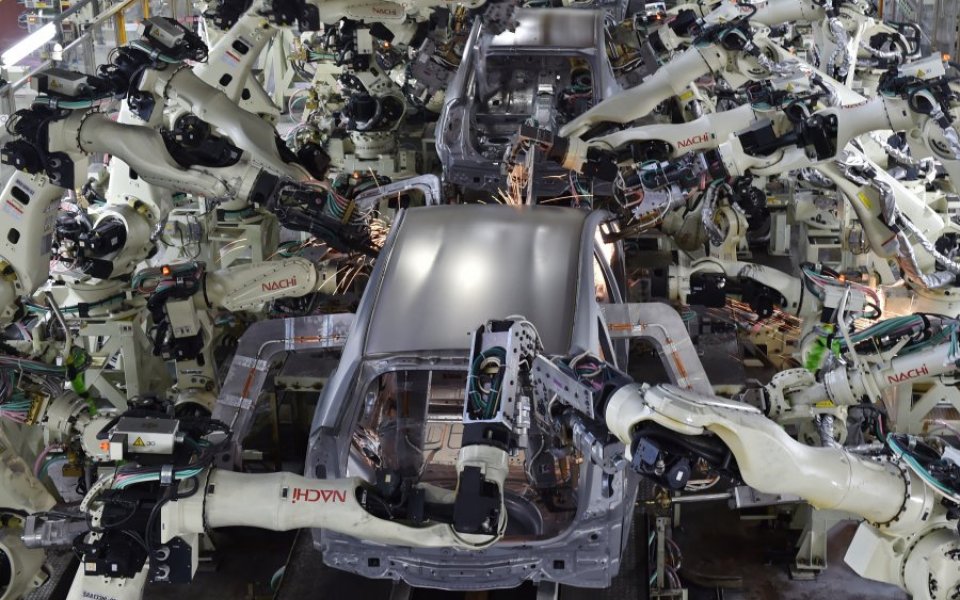Davos: Businesses will wither and die if they ignore the coming technological paradigm shift

It might be tempting to think that the World Economic Forum (WEF) in Davos this week is a talking shop where nothing meaningful happens. You have 2,500 people in the mountains going from presentation to reception to dinner for three days. But the event is a vital way for business, policy-makers and civil society to address the challenges we face now and in the future. The prospect of a new industrial revolution is just one of those challenges.
This year’s meeting comes at a particularly febrile time. Since the last WEF meeting, the Middle East has convulsed under the so-called IS and the legacy of change which started with the Arab Spring. Vladimir Putin has used statecraft to make sure the world knows that Russia is still a global power. Europe has grappled, and struggled to cope, with the largest migration of people since the Second World War. The people of Europe have looked to the left and right of the political spectrum for solutions to their own particular problems. Rationality finally prevailed over a Chinese stock market pumped up by leverage and over-confidence, the US raised interest rates for the first time in nearly a decade, and dropping commodity prices sent ripples through almost all markets.
Change happens constantly but rarely has there been a year in recent times in which so many paradigms have shifted. It is one of the reasons why Davos is important. In modern times, most big changes are now not limited to individual nations, specific companies or particular groups in society. Ours is a more connected world than ever before. That means business leaders, policy-makers and civil society groups have a shared responsibility to spread the burden of reflecting the changing world around them. The WEF provides a forum which enables these disparate groups to meet and work together to find solutions.
The meeting isn’t just about current challenges, though. It’s also about looking forward. A new impending industrial revolution is one of those future challenges which we cannot afford to ignore and is the theme for this year’s WEF meeting.
This latest industrial revolution is already underway but its impact is only just starting to be felt. The “Fourth Industrial Revolution” refers to an era where new technology will allow humans to create sophisticated objects capable of allowing us to do more or to do what we already do more efficiently. Systems which businesses use will gain a degree of intelligence by using the internet to communicate with their operators and make decisions on behalf of them. It extends the “Internet of Things”, where devices use an internet connection to provide something more effective to the user than would otherwise be the case. This is already changing consumers’ lives, whether through the veritable arms race to create driverless cars or our mobile phones which place all the information on the internet in our pocket.
The effect on how companies do business will be massive. Consider a machine in a factory which is capable of analysing when it will need repairing, can then order the part and adjust the factory’s power requirements to allow for the period when the part is being changed. The efficiency savings and increased productivity speak for themselves. Some of the largest industrial companies in the world are heavily investing to create exactly this kind of machine, capable of a level of sophistication that simply hasn’t been possible before.
Clearly we need to avoid hubris. There is a tendency for technology companies to overstate the impact of their latest innovation. We should not be surprised when technology entrepreneurs claim that the product they’ve developed is “transformational” but neither should we assume it will be. There will be as many products which fail as succeed. It was ever thus but the ones which do succeed will have a huge impact.
Financial services will change too. Part of this new industrial revolution comprises the masses of data which can be garnered because of the use of online services. Companies have the potential to make products which are far more tailored to what customers actually want and need. In financial services, as with most other sectors, the businesses which survive will be those which adapt to this changing world.
The companies that don’t adapt will wither just as the cottage industries of the eighteenth century did when mechanisation changed Britain’s industrial landscape forever. Business leaders are competitive, but globalisation means we have shared interests in addressing present and future challenges. Governments need to provide a framework for how technological change happens. Civil society must claim its part and business leaders have to work with both if they’re truly going to flourish.
Talk may seem as cheap at Davos as anywhere else, but if you’re not part of the conversation then you will be left behind.